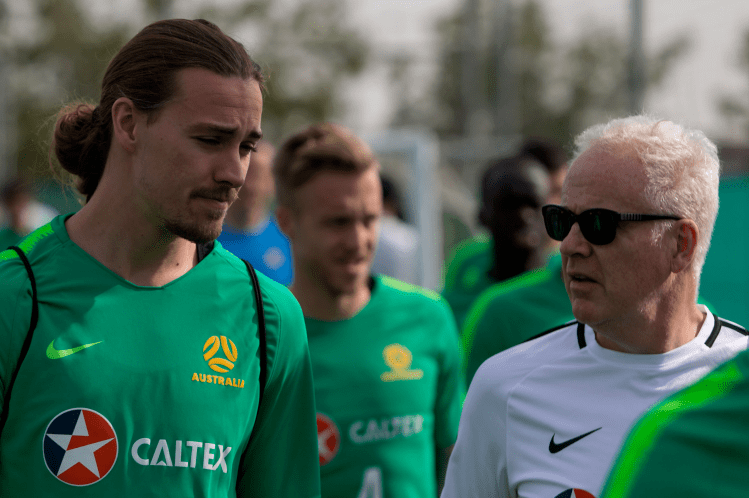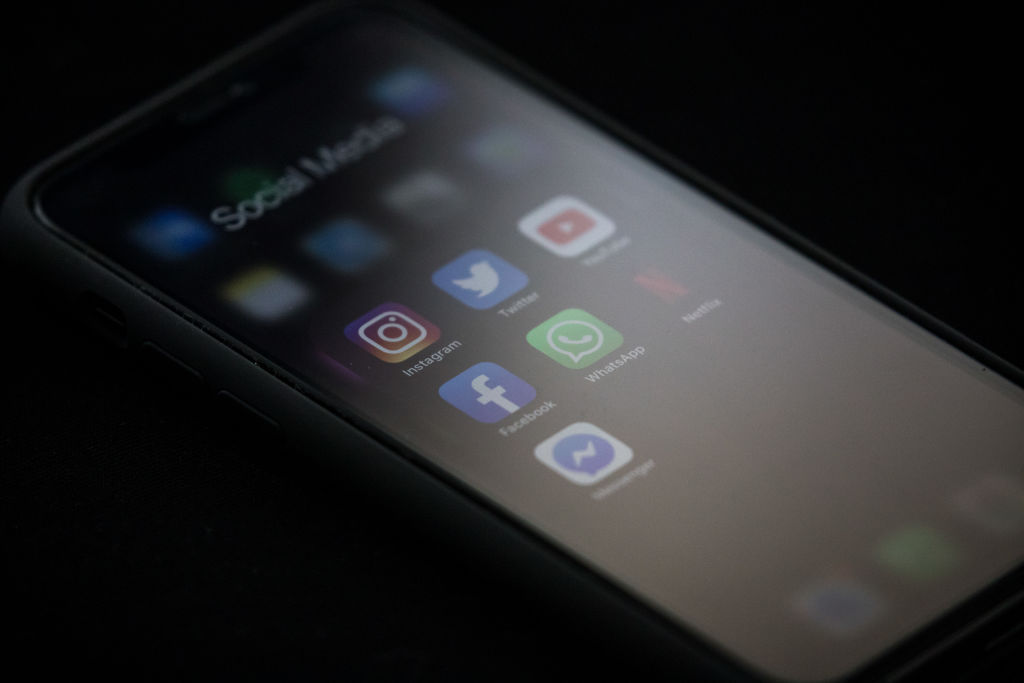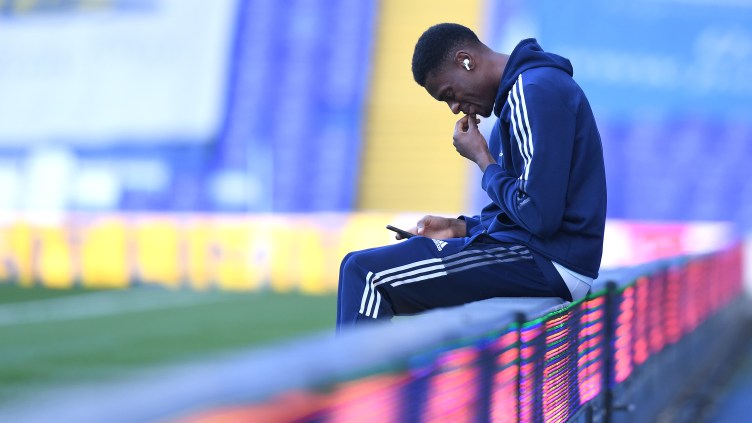Mike Conway has worked with a number of A-League clubs and the Socceroos as an emotional agility coach – this was the stark address he delivered to one club’s players over their mobile phone use.
Picture the scene. It’s after lunch on a training day and sitting in front of me is one of our top A-League club squads. As I’m waiting to deliver my presentation I take in the atmosphere.
Plenty of banter, good-humoured chat. Plenty of Instagram image sharing; some players just texting; some watching clips of recent games. The coach brings the room to a hush and introduces me to the players. I get a warm reception, and I begin with the following question.
“If I could give you 5% to 10% more energy for your game, would you take it?” I notice the puzzled and surprised looks and a few mutterings between the players and the coaches. I ask again: “If I could give you 5% to 10% more energy for your game, would you take it?” This time the response is a few nodding heads and a few mutters of “yes” around the room.
“Good,” I tell them, “I’m going to show you how.” And I pick up my mobile phone.
“How many of you are doing some or all of the following: checking your phone when you get up, when you’re at breakfast, in the car, before training, after training; while watching tv or on the bus; just before the game; after the game. During the game!”
There’s plenty of laughter at this. “At lunch time; at dinner time. Before you go to bed.”

Everyone nods. I confirm I used to be just like that but bit by bit I’ve worked myself into a slightly less addictive pattern. I know my pattern because I measure it. I put up a slide of my screen time over the past week. On average it’s around two and a half hours a day.
We have a competition – the highest and lowest. I win the lowest screen time award. The highest in the group was just under five hours.
The brain uses 20% of all our energy so even two and a half hours per day is a big use of our daily energy. Clearly confirming what we know: whilst we do love our phones, these incredible devices are also addictive and do affect performance. Add a smart watch and we’ve got a new human species emerging, one that is more tuned into the world through the glass cover than the physical world around us.
More immediately, use of the phone has measurable effects on performance. When you’re tuned into your phone your mind is on the alert for responses to the information you’re receiving.

These fight-flight responses kick the stress hormones into action, increasing the heartbeat, speeding up breathing, contracting muscles and opening the sweat glands. All these things are happening without you knowing and mostly not noticing. The more we tune into the information we’re receiving, the more we need to find out to confirm what we’ve just seen or read.
Our whole being becomes focused on this. The physiological implications are huge: eyes strain as we become micro-focused on this small device in our hands. Our shoulders and neck also strain as we bend forward to get closer to the screen. Now we’re trying to balance and control a 5kg weight – that’s what your head weighs – in an uncompromising position as our body temperature increases due to the additional heat coming from this powerful machine.

As a footballer, you begin to read a media piece about yourself on this tiny device. Your antenna are up – is this a good story or a bad story? Are people giving enough “likes” or not acknowledging you?
Enough likes: we smile, happy for a few minutes then we check again – have I got more likes? Maybe there aren’t enough likes. Our mood swings through fear, happiness, joy, worry, and so on. Our brains are in overdrive and this bubble becomes our life whilst we’re in it.
Hormones are being pumped around the body to protect us. The amazing power of human logic is being put to sleep as the more powerful emotional part of our brain takes over. We’re on high alert! We overthink the implications of what we’ve just seen! We need confirmation that everything is ok!
We go on more searches on our device to resolve what we’ve just seen. More and more time in this unnatural position straining at this tiny screen. The more we do this, our fingers and our brains become more jittery. The more we tap and social media post, the noisier the brain gets, already soaking up lots of your energy.
Are we also training our brains to be less attentive due to the rapid switching between pages, posts, and what people are doing? A famous study at a US college showed that people in a room with a TV and a computer switched their eyes back and forth every 14 seconds. That’s 120 times in 27.5 minutes.
As distraction becomes our norm, we begin to crave it, desperate for action. It runs totally counter to the work that I’m trying to do: help players and coaches maintain focus and attention for 90+ minutes. Remember: one distraction can be the difference between a win or a loss. Evidence also suggests that those who are regularly distracted can have a 10 point reduction in IQ.
Then there’s the mood change. Scientific evidence points to a strong association between checking social media and anxiety/depression. We’ve recently heard of the bullying and judgement rife in social media. One of the most powerful and devastating emotions any human has to deal with is humiliation. Counter to this, lower levels of social media interaction improves overall wellbeing and a heightened optimism. Possibly something which might help performance on the field perhaps!
The conversation I’m having with those players and coaches becomes became a rich one. A couple of players acknowledge that these devices are affecting the most important pillar in delivering high performance: sleep/rest. (In the next column I will provide some guidance on this).
“So,” I ask the room. “Have you bought into the idea that we can get 5-10% more energy for your games?” This time the “yes” is resounding. The players commit to a number of simple changes, including:
· Reduced daily use of phones and phone checking by 50%
· Listening to music rather than checking phones in the hours leading up to a game.
· Removing phones from the bedroom an hour before rest and in the evening dimming the screen brightness
· Noticing and reflecting on how we are using phones – both positively and negatively.
· Moving phones further away from our eyes and regularly blinking (to reduce dry eye).
· Turning phones off and putting them away when meeting people.
· Lifting phones up horizontal to the eyes rather than crouching over it.
· Regular reviews of phone use and share changes with a trusted friend
That A-League team went on to win their next three games.
Mike Conway is the Founder and CEO of XVenture. His passion and interest is working with individuals and teams who are committed to being great. In elite sport, he has worked with teams including Sydney FC, Perth Glory, WBBL Sixers & Thunder, Olympians and the Socceroos. He is also highly sought after in the corporate world and is a professor at UOW specialising in leadership, teamwork, experiential learning and EQ. Mike is the author of the FCA XV Essential Skills Program (www.fcaxvcollege.com)





